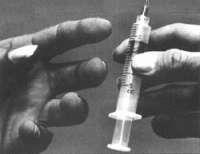Heroin Addiction

Heroin Effects
Heroin Effects: Short Term
Soon after injection (or inhalation), heroin crosses the blood-brain barrier. In the brain, heroin is converted to morphine and binds rapidly to opioid receptors. Abusers typically report feeling a surge of pleasurable sensation, a "rush." The intensity of the rush is a function of how much drug is taken and how rapidly the drug enters the brain and binds to the natural opioid receptors. Heroin is particularly addictive because it enters the brain so rapidly. With heroin, the rush is usually accompanied by a warm flushing of the skin, dry mouth, and a heavy feeling in the extremities, which may be accompanied by nausea, vomiting, and severe itching.

Short-term effects of heroin
- Rush
- Depressed respiration
- Clouded mental functioning
- Nausea and vomiting
- Suppression of pain
- Spontaneous abortion
After the initial effects, abusers usually will be drowsy for several hours. Mental function is clouded by heroin's effect on the central nervous system. Cardiac functions slow. Breathing is also severely slowed, sometimes to the point of death. Heroin overdose is a particular risk on the street, where the amount and purity of the drug cannot be accurately known.
Heroin Effects: Long Term
One of the most detrimental long-term effects of heroin is addiction itself. Addiction is a chronic, relapsing problem, characterized by compulsive drug seeking and use, and by neurochemical and molecular changes in the brain. Heroin also produces profound degrees of tolerance and physical dependence, which are also powerful motivating factors for compulsive use and abuse. As with abusers of any addictive drug, heroin abusers gradually spend more and more time and energy obtaining and using the drug. Once they are addicted, the heroin abusers' primary purpose in life becomes seeking and using drugs. The drugs literally change their brains.

Long-term effects of heroin
- Addiction
- Abscesses
- Collapsed veins
- Bacterial infections
- Infection of heart lining and valves
- Arthritis and other rheumatologic problems
- Infectious diseases, for example, HIV/AIDS and hepatitis B and C
Physical dependence develops with higher doses of the drug. With physical dependence, the body adapts to the presence of the drug and withdrawal symptoms occur if use is reduced abruptly. Withdrawal may occur within a few hours after the last time the drug is taken. Symptoms of withdrawal include restlessness, muscle and bone pain, insomnia, diarrhea, vomiting, cold swapes with goose bumps ("cold turkey"), and leg movements. Major withdrawal symptoms peak between 24 and 48 hours after the last dose of heroin and subside after about a week. However, some people have shown persistent withdrawal signs for many months. Heroin withdrawal is never fatal to otherwise healthy adults, but it can cause death to the fetus of a pregnant addict.
At some point during continuous heroin use, a person can become addicted to the drug. Sometimes addicted individuals will endure many of the withdrawal symptoms to reduce their tolerance for the drug so that they can again experience the rush.
Physical dependence and the emergence of withdrawal symptoms were once believed to be the key features of heroin addiction. We now know this may not be the case entirely, since craving and relapse can occur weeks and months after withdrawal symptoms are long gone. We also know that patients with chronic pain who need opiates to function (sometimes over extended periods) have few if any problems leaving opiates after their pain is resolved by other means. This may be because the patient in pain is simply seeking relief of pain and not the rush sought by the addict.
